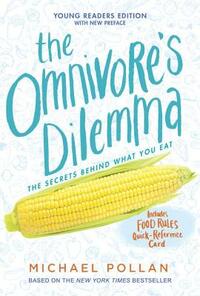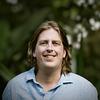Take a photo of a barcode or cover
informative
inspiring
medium-paced
“But imagine for a moment if we once again knew, strictly as a matter of course, these few unremarkable things: What it is we’re eating. Where it came from. How it found its way to our table. And what, in a true accounting, it really cost.”
In 2006 author Michael Pollan decided to write a book about the question that echoes around the world every evening: “What should we have for dinner?” Almost 20 years later his research and writing continues to challenge the way farmers, industry, and consumers approach what — and how — we eat.
This book has been floating around my periphery for years, but I avoided picking it up because I knew it would make me want to change my family’s eating habits in ways that weren’t possible. It’s only now (when I have more money and live near a large city that makes it feasible for local producers to survive) that reading a book like this could be anything other than frustrating and depressing. I agree with his premise that it’s better for animals and the Earth to eat meat sourced from local/non-industrial producers; the fact that the meat is more expensive means we’ll eat less of it overall, which is probably also a good thing for the world.
Some reviews complain that the book takes too long to get to the point, and focuses on some of the wrong things. I think that’s a reflection of the book’s age rather than its content. Pollan’s book was groundbreaking in 2006, but these days the details and arguments about feedlots, slaughterhouses, pesticides, overproduction, industrial vs. organic, and even foraging are much more commonplace. It was also published before there was widespread recognition of the prohibitive expense of organic meat production, food deserts, and other systemic issues that make it harder for most people to eat more sustainably (even if they want to). Fortunately it looks like Food, Inc. 2 (the 2023 sequel to Food, Inc.) might be recent enough to take these newer perspectives into account.
Only read this if you’re able and prepared to make changes to your dinner (and breakfast and lunch) menu.
In 2006 author Michael Pollan decided to write a book about the question that echoes around the world every evening: “What should we have for dinner?” Almost 20 years later his research and writing continues to challenge the way farmers, industry, and consumers approach what — and how — we eat.
This book has been floating around my periphery for years, but I avoided picking it up because I knew it would make me want to change my family’s eating habits in ways that weren’t possible. It’s only now (when I have more money and live near a large city that makes it feasible for local producers to survive) that reading a book like this could be anything other than frustrating and depressing. I agree with his premise that it’s better for animals and the Earth to eat meat sourced from local/non-industrial producers; the fact that the meat is more expensive means we’ll eat less of it overall, which is probably also a good thing for the world.
Some reviews complain that the book takes too long to get to the point, and focuses on some of the wrong things. I think that’s a reflection of the book’s age rather than its content. Pollan’s book was groundbreaking in 2006, but these days the details and arguments about feedlots, slaughterhouses, pesticides, overproduction, industrial vs. organic, and even foraging are much more commonplace. It was also published before there was widespread recognition of the prohibitive expense of organic meat production, food deserts, and other systemic issues that make it harder for most people to eat more sustainably (even if they want to). Fortunately it looks like Food, Inc. 2 (the 2023 sequel to Food, Inc.) might be recent enough to take these newer perspectives into account.
Only read this if you’re able and prepared to make changes to your dinner (and breakfast and lunch) menu.
challenging
informative
inspiring
reflective
medium-paced
informative
reflective
medium-paced
A very interesting read about how our food makes its way to our plates. A good read for anyone wanting to learn more about the modern day food chain.
This book has a lot of highs and lows for me. Pollan, as ever, is just pleasant to read, but I find some of the arguments either less convincing or sometimes on pretty shaky ground.
That being said, the book is just interesting. The section on organic farming, especially, is eye opening for many who assume that Organic means something specific. The reality is a bit more complicated. This was probably groundbreaking at the time of publication, but I think it's wider known now. Even so, I would assume most people are as ignorant now as they were fifteen years ago about how much of organic farming has become an industrial process dramatically removed from the images that come to mind when we hear words like Organic or Free Range or even Grass Fed.
Overall, it's probably my least favorite book by Pollan, but that may just be because I think I've sort of exhausted myself on Pollan's worldview. It's also not helped that he generally presents information I already know.
Having said that, Polyface Farms is almost worth the book by itself. Not just because it's an interesting section that may fill you with hope about our food system, but because I think Joel Salatin represents a type of American that is largely ignored. A bizarre concoction of environmentalism, anti-government ranting, and religious eccentricities. The fact that he doesn't easily fit into our conceptions of left and right makes him an ideal case study for the way media has distorted our understanding of ourselves. I think most americans vote in a highly partisan manner, but I think most find themselves as political outcasts or outsiders because neither Republicans nor Democrats speak to them.
Anyrate, good stuff.
That being said, the book is just interesting. The section on organic farming, especially, is eye opening for many who assume that Organic means something specific. The reality is a bit more complicated. This was probably groundbreaking at the time of publication, but I think it's wider known now. Even so, I would assume most people are as ignorant now as they were fifteen years ago about how much of organic farming has become an industrial process dramatically removed from the images that come to mind when we hear words like Organic or Free Range or even Grass Fed.
Overall, it's probably my least favorite book by Pollan, but that may just be because I think I've sort of exhausted myself on Pollan's worldview. It's also not helped that he generally presents information I already know.
Having said that, Polyface Farms is almost worth the book by itself. Not just because it's an interesting section that may fill you with hope about our food system, but because I think Joel Salatin represents a type of American that is largely ignored. A bizarre concoction of environmentalism, anti-government ranting, and religious eccentricities. The fact that he doesn't easily fit into our conceptions of left and right makes him an ideal case study for the way media has distorted our understanding of ourselves. I think most americans vote in a highly partisan manner, but I think most find themselves as political outcasts or outsiders because neither Republicans nor Democrats speak to them.
Anyrate, good stuff.
Definitely a provocative and informative book. Its limited in its scope and obviously seen through Pollan's lens. However, the book is open about this and well researched. Manages to make something so depressing and complicated (the state of food in our culture) entertaining and engaging.
challenging
informative
reflective
medium-paced
challenging
informative
reflective
medium-paced
Never thought I would learn so much about corn. Very thoughtful book, dove into the goods & bads & uglies of Americas food chain. Almost too analytical for me since I already over think everything and this made me not want to eat any food at all for a couple days there… but guess that’s part of the Omnivores dilemma. Overall enjoyed Pollan’s dialogue.
Audible
Audible





